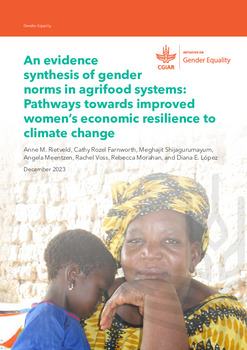An evidence synthesis of gender norms in agrifood systems: Pathways towards improved women’s economic resilience to climate change
Abstract
The evidence synthesis aims to develop a systemic understanding of how women manage their livelihoods and organize food for household consumption when the agrifood systems within which they live are being affected, sometimes devastatingly, by climate change. The hypothesis is: ‘Restrictive gender norms generally limit women’s capacity to adapt to climate change and to build and maintain their livelihoods’. To help evaluate this hypothesis, the evidence synthesis pulls together an extensive literature review with data from GENNOVATE fieldwork-based case studies. The primary focus of the evidence synthesis is on how gender norms facilitate, or hamper, women’s abilities to put food on the table and to achieve economic resilience in the face of climate change. The conceptual framing examines the workings of gender norms and how they are contested through selected variables — women’s power and agency, intersectionality, and women’s location in their life course — to arrive at a picture of how women are negotiating climate change in their everyday lives. Diagnostic questions help to guide the analysis. For example, are women able to be pro-active, to take decisions to adapt and even transform their lives? Are women being pushed — through a range of gender norms which set limits on their agency — towards increasingly unviable livelihood strategies? Findings are presented in two sections. Section 3 focuses on gender norms in relation to women’s resilience in the food production system. Findings are structured according to the specific gender norms. Gender norms that are most significant in the household sphere are presented first, followed by discussion of gender norms which shape interactions in the community sphere. The section concludes with an appraisal of gender norms in the organisational sphere. Section 4 presents findings in the food consumption system according to specific themes such as food preparation and food preferences which details normative dimensions across different levels. Section 5 briefly synthesizes the findings and is followed by a presentation of a conceptual framework on economic resilience pathways (Section 6). The framework provides women with three potential economic resilience pathways in response to their climate change-related challenges. These pathways are (1) absorptive resilience pathway, (2) adaptive resilience pathway, and (3) transformative resilience pathway. A final pathway, (4) inability to cope, does not facilitate resilience. This aims to help direct further, targeted research and development efforts.

